Portraits of New York Chinatown
Initiated as an oral history project by artist Tomie Arai and scholar Lena Sze as MOCA prepared to move into its current home in 2009, the project addressed the vital question of MOCA's own role within the communities of Chinatown, Little Italy, and SoHo through interviews with 27 neighborhood residents and community leaders. At the core of these conversations were the ever-present concerns of gentrification and displacement.
Rights & Usage:
All rights to the interviews, including but not restricted to legal title, copyrights and literary property rights, belong to the Museum of Chinese in America (MOCA). Interview can only be reproduced with permission from the Museum of Chinese in America (MOCA).
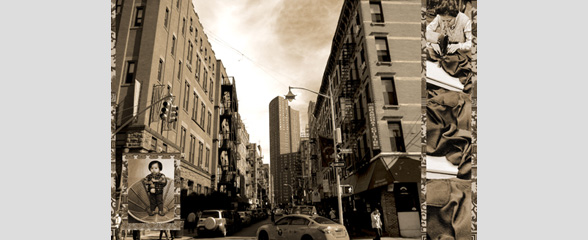
2013.022.001 Oral History Interview with Anne Ho
Anne Ho is a longtime resident of Chinatown in New York City. Ho reflects on how her family moved to the United States and her early childhood growing up in Chinatown. She discusses the garment factory her mother worked at along with her daily routine living in Chinatown. She continues the discussion of garment factories by stating their importance of Chinatown during her childhood along with how Chinatown has changed overall. She then goes to discuss the development of Confucius Plaza and the types of people that lived there. Ho predicts how Chinatown will change in the future. She shares a story of going back to China and meeting her family. Lastly, she states the subjects that should be included in exhibitions and museum archives.
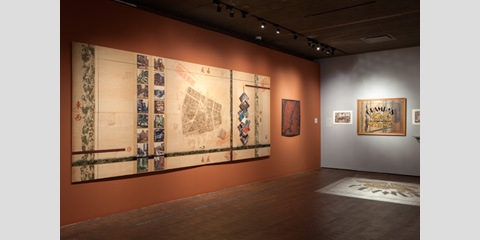
2013.022.002 Oral History Interview with Don Kao
In this oral history Don Kao discusses his life living in Chinatown along with his involvement in Asian American and gay rights activism organizations. Kao first discusses his family background along with the professions his parents had. He compares the different cities he grew up in along with the schools he went to during his childhood. The interview continues as Kao comments on the racism in the community he grew up in along with meeting other Chinese Americans. His experiences during the gay rights movement, being among individuals of the gay community, and other collaborating with Asian Americans is discussed in depth. Lastly the interview concludes with Kao reflecting on living with HIV and AIDS along with others he knew in the gay community that contracted these infections.
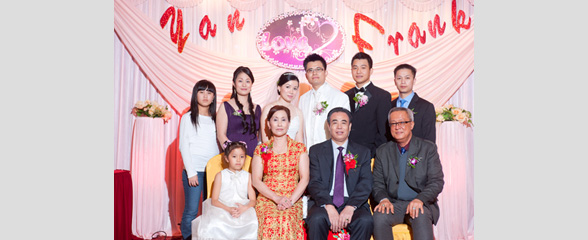
2013.022.003 Oral History Interview with Frank Liu
Frank Liu, former Director of Technology at MOCA, sits down with Tomie Arai to conduct an oral history recounting his experience growing up in Chinatown during the ‘90s and early 2000s. Liu discusses his family’s history and their experience immigrating to the U.S. from Fuzhou, Fujian when he was seventeen years old, in 1998. He discusses how his uncle was able to sponsor his family to come to the U.S. and how his family moved to Chinatown initially upon their arrival. He discusses how even though his family was able to immigrate to America legally through his uncle, many other Fujianese people at the time were smuggled to America illegally in hopes of a better future for themselves and their children. Liu talks about the two main groups of people in Chinatown: the Fujianese and the Cantonese. He discusses his ties to the Fujianese community in Chinatown through his mother, and how his family gets together for family reunions to see each other and feel connected through their Fujianese roots. He talks about meeting his wife and learning to communicate with her family, since she is originally from Taishan and her parents only speak Cantonese. He talks about how glad he is that his mother encouraged him to go to school and study instead of taking the more traditional route of earning money right away, and he remarks on how much he values his education. Frank introduces some artifacts that are important to his family’s history, such as photos from when they first immigrated, photos from the first time they rode the New York subway, and a digital camera that he saved for and was the first important object that he purchased for himself with his earned savings. The interview ends with the discussion of a Fujianese museum or community archive, and the materials or items that Liu would want included in that documentation effort.
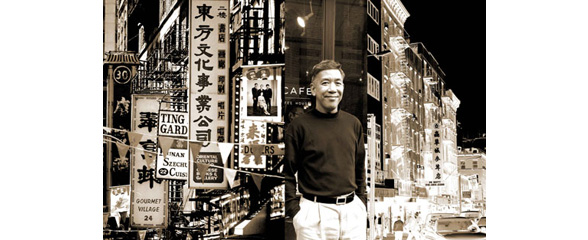
2013.022.004 Oral History Interview with Henry Chang
Henry Chang is a detective novel author and was born and raised in New York City Chinatown. In this oral history he shares a background of his family history along with when he came to Chinatown. Chang was involved in the creation of Yellow Pearl along with the civil rights movement. Chang discusses the significance Yellow Pearl has on his life along with a poem he wrote for the publication. He recounts on the ways he documented the history of Chinatown and the process of putting this history into his books. Lastly, he discusses the ways Chinatown is changing along with his favorite restaurant Grandpas.
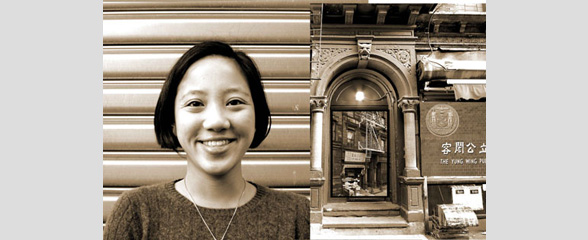
2013.022.005 Oral History Interview with Jenny Ye
Jenny Ye is a college student at Harvard University and spent her childhood in Chinatown. In this oral history Ye focuses on her childhood and experiences attending public schools in the New York City Chinatown area. She recounts spending time with her family and her cousins and growing up in Chinatown. Ye attended PS 124 and shares her autograph book as she recounts fond memories during elementary school. She also discusses her time in middle and high school with her involvement in CCAV and the Chinatown Youth initiatives groups. She reflects on how Chinatown has changed with the progression of gentrification. The interview concludes with a deeper discussion of her time at PS 124 and the TVB video rental store.
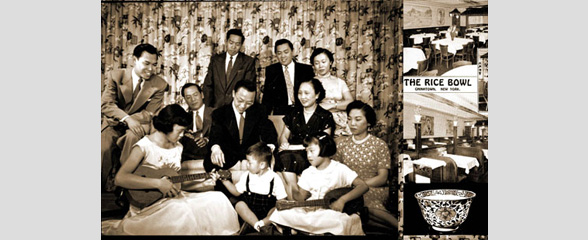
2013.022.006 Oral History Interview with Marcella Dear
Marcella Dear, a longtime friend of MOCA and a generous donor of over 900 objects, joins us to discuss her exciting life and her memories of Chinatown. Marcella goes into depth about many of the objects she donated, and discusses not only their significance as sentimental objects but also how these objects were used in their original setting, at the Rice Bowl restaurant on Mott Street. Marcellas father founded the Rice Bowl, and she discusses her childhood growing up in and around the restaurant. She fondly remembers her regular clients, who came to feel like family to her over the years. She talks about her father and his eminent role within the community, both when she was growing up and afterwards. She remembers how he wanted to build a museum to house all of his collections and to share cultural treasures with the Chinatown community. She talks about how Chinatown has changed, and about how the immigrant experience has also changed. She discusses the importance of the neighborhood associations in helping new immigrants with paperwork in English and by helping them acclimate to life in the U.S. Marcella talks about her life as a young person, going to college at NYU and having parties and socials for the Chinese students at NYU and the neighboring city schools. Marcella briefly discusses the gang wars and the impact this had on the neighborhood. She ends her interview talking about memorable places in Chinatown and what they mean to her.
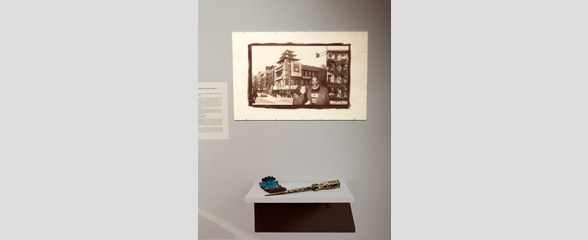
2013.022.007 Oral History Interview with Marilyn Sontag and Daniel Carter
Husband and wife Daniel Carter and Marilyn Sontag sit down with Tomie Arai to discuss their lives living at 218 Centre Street, and all of the changes in the neighborhood that they have watched since they moved in in 1970. They begin by discussing their lives prior to their move to New York City, and how they found their apartment, which was actually designated as an artist residence, through word of mouth. Marilyn is a visual artist, and Daniel is a composer and musician. The couple discuss the changing borders of Chinatown over the years, and they describe the location of their residence as right on the border between what is left of Little Italy and Chinatown. When Marilyn and Daniel elaborate on the changes in Chinatown through the years, they stress that the main change is the expansion of Chinatown. They share anecdotes from their life in the seventies and share stories behind artifacts that they kept for sentimental reasons, such as old street signs, a piece of cast iron from their building after a remodel, and photographs, among other treasures. They discuss what it has been like to be a part of the Chinatown community peripherally, and they share many anecdotes about their life together living in the same place for 45 years.
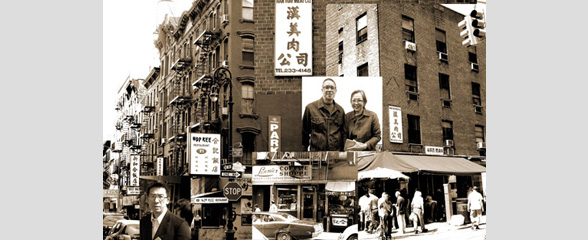
2013.022.008 Oral History Interview with Pamela and Tom Lee
In this oral history husband and wife Tom and Pamela Lee share their experiences living and working in New York Chinatown. Tom and Pamela discuss their childhoods and how they came to live in New York. They both reflect on working at the butcher shop owned by his family. Tom also discusses the farm his father operated along with the tasks his mother completed at their family business. The couple also contemplates how Chinatown has changed over many decades and the cultural differences each generation of Chinese Americans experience.
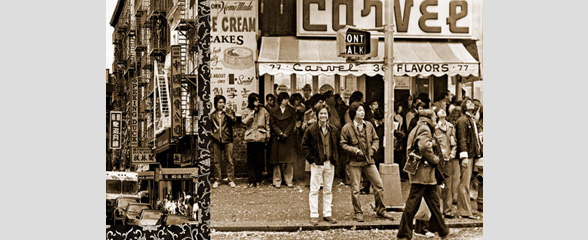
2013.022.009 Oral History Interview with Wing Lee
Tomie Arai and Janice Lau sit down with Wing Lee to discuss his life and his experience growing up in and around New York Citys Chinatown in the 60s through the 80s. Wing talks about what it was like as a kid being raised in the US with Chinese parents, and growing up on the streets of Chinatown. He talks about the schools he went to in the area, and all the spots the neighborhood kids used to hang out. Later on in his late teenage years, he describes the experience at a popular neighborhood bar called Grandpas. Wing describes the atmosphere at Grandpas, the regulars there, and how he was eventually asked to design a t-shirt for the bar as well as a large mirror to hang in the space. He touches on the gang presence in Chinatown in the 70s, and describes the changes he has seen in the neighborhood since his youth. He feels hopeful for the future of Chinatown and believes that the quality of life has improved for your average Chinatown resident. He is excited that the area is now taken seriously politically and that Chinatown has Asian and Chinese representation within the city government. Wing is an artist, and he is excited to see the museum documenting this important community history.
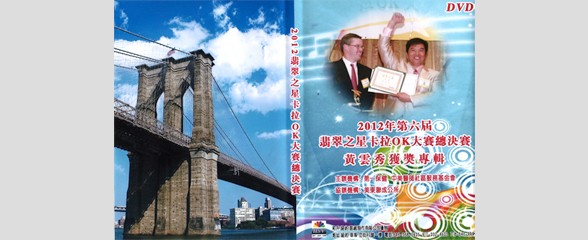
2013.022.010 Oral History Interview with Yun Xing Huang
Yun Xing Huang was interviewed by MOCA to talk about his immigration and living experiences in New York City’s Chinatown. As a professional singer, Huang owned a nightclub in Fujian before coming to the US during the prevalent immigration wave in China. He worked as a food delivery person before opening a floral shop on his own, singing songs for wedding parties, and acting in films. He praised the brave spirit of Fujianese people but touched upon the geographical discrimination between Changle people and Lianjiang people, who are both from Fujian province, in Chinatown.
However, when asked about his views on Chinatown, Huang expressed negative sentiments. He drew from his own experience in a film depicting the living situation in Chinatown, where new immigrants live in small spaces and must even climb up to four-level beds due to limited budgets. This continues to be a reality for many immigrants in Chinatown today.
In the end, Huang emphasizes the importance of legal status for Chinese immigrants. Their temporary immigrant status discourages them from traveling, buying houses, and conducting large business transactions. Only legal status can guarantee stability and prosperity for the Chinese community.